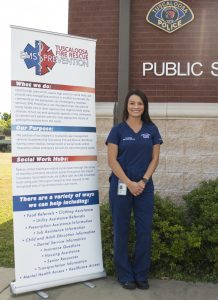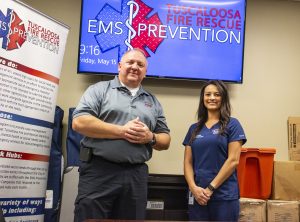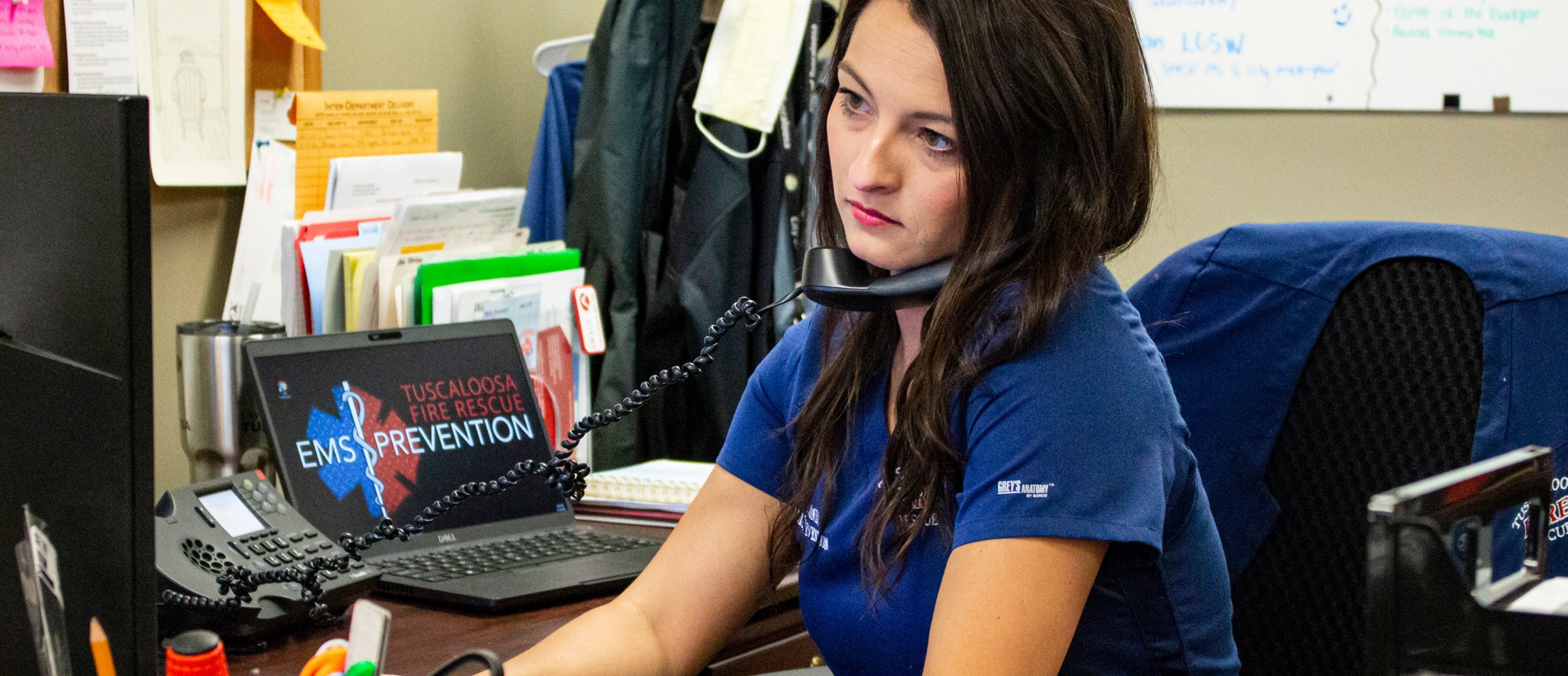MSW alumna began as intern in program
May 16, 2020
By David Miller

Brianna Jones, who earned both her BSW and MSW at the University of Alabama, is the coordinator of the EMS Prevention Program in Tuscaloosa.
Brianna Jones had identified her “dream job” just one week into her MSW field placement.
In the spring of 2017, Jones was one of a handful of interns with Tuscaloosa Fire and Rescue, which had formed a partnership with the University of Alabama School of Social Work to enhance its 911 prevention program. Each semester, interns would manage a caseload of four to six clients throughout the Tuscaloosa area, with the goal of connecting them to social services to help lessen the frequency of non-emergency 911 calls.
After orientation and a few ride-alongs with firefighters in the first week of her placement, Jones called her mother, both excited about a potential new career path.
“I told my mom that, if there’s ever a coordinator position created – there was nothing on the table at that point – and they can prove this program works, this would literally be my dream job,” Jones said.
Jones’ dream would be fulfilled – twice – beginning two years after she began her placement at Tuscaloosa Fire and Rescue. The City of Tuscaloosa created an EMS prevention coordinator position through the Tuscaloosa ACTION program – a grant-funded partnership between UA and the city – and hired Jones for the role in spring 2019. After grant funding exhausted for the position, the city opted to fund it and re-post the job, after which Jones was again hired.
“When I got hired, I thought, ‘this is so cool how this happened for me,’” Jones said.
Jones’ husband, Tyler, is a firefighter in Tuscaloosa, so her passion for the position extends beyond the quality of service she provides for her more than 30 clients throughout the city. She’s keen to support the fire department’s broader safety initiatives, both for the firefighters themselves, and members of the community. For instance, Jones, along with EMS Chief Chris Holloway, have organized a week’s worth of virtual information and safety education sessions for EMS Appreciation Week (May 17-23).
Still, at the core of her responsibilities is to maintain the progress the program has made since its inception four years ago, and to provide qualitative data while maintaining high-quality service. The program has successfully reduced the number of non-emergency calls because of social work interns and the program coordinator’s knowledge of social services networks and their ability to identify the root causes of issues, which allows the program to leverage local services to meet needs and mitigate circumstances.

Jones manages more 30 than cases throughout Tuscaloosa.
Managing a full case-load – periodically with the help of UA School of Social Work interns – is challenging, Jones said, but she’s been aided by existing familiarity with the area’s social services agencies from her time working in medical case management at Whatley Health Services. However, once she began interning for the EMS prevention program, she would better understand the hardships some citizens face due to their lack of healthcare and lack of knowledge of services to address things like physical therapy or help paying bills.
“Being on one side of it, working in a medical facility, all I knew is, ‘this patient isn’t following up … they’re not getting their meds,’ and it’s easy to place blame on patient,” she said. “But when I went out into the field, went into that person’s home and did an assessment where they’re most comfortable, I got to see their struggles, like not having transportation, living on a fixed income, or having to pay a neighbor $10 to bring them to the doctor, which is a lot for people on a fixed income.
“When you have [patients] in the medical facility, they’re not necessarily giving you all the information to help connect the dots.”
Connecting those dots could result in a number of revelations, like a citizen falling in their home and needing a lift-assist, or even help changing a lightbulb. Additionally, mental health issues are becoming more prominent emergency calls, Jones said.
“The goal for me is to go in, see what that issue is, and then make a referral,” Jones said. “In the case of an elderly person falling, it would be home health for physical therapy to reduce the amount of times the fire department has to go there. It also links another health professional with them.
“It’s important to note: even when I go out there, I never tell anyone to not call 911; if you have a true emergency, call 911, because that’s what we’re here for.”
